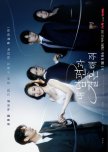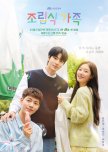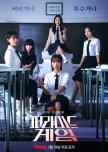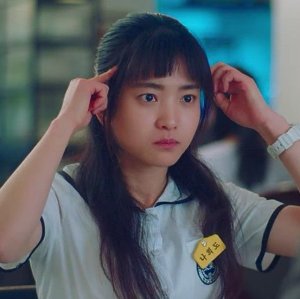
This review may contain spoilers
Promising premise but struggles to deliver on its potential.
MMH tried to main 3 things- Revenge, Romance and Extramarital Affairs.It had a great cause for revenge and a good setup with the time travel..unfortunately carried out by a protagonist who did not look like someone who was on a mission after being cheated on, betrayed and eventually murdered but given a 2nd chance in life to correct things. There was very little conviction in her act. The retaliations and conflicts with the main antagonist felt so flat and almost childish throughout. It was challenging to fully empathize with her character or become emotionally invested in her route to victory because of her attitude. Ultimately ended feeling unsatisfied with her victory. PMY suffered almost every possible misfortune yet had lesser burning desire than BoA who came late into the picture with super overboard reactions for what seemed like relatively smaller reasons. Sums it up really.
The romance...was so dead, so dry. Bro get this, the FL had THREE love interests in the show but I felt ZERO chemistry. None, nada, missing!!! Both PMY and NIW felt like people who were not deeply bothered about being in love for the majority of the show, which was fine until they tried to make it about romance again later on. The ML character was not it..he was one-dimensional, sluggish, and predictable every single time he appeared. I had the hardest time watching him. His stoic character paired with the reserved personality of the FL did not create any spark even with time. It would have made sense if she was focused on revenge to think about love but even that was lacking. Towards the latter half when the show shifted focus to their romance..it felt like they were doing speed dating..forcing the sparkless romance onto the viewers, meh~ The one guy who felt like could be something warm (the chef) was friend-zoned almost immediately so that she could run back to her boring boss.
The affairs were probably the only thing done decently well but sadistically speaking- it lacks the usual thrill to the genre because most of the cheating was done on knowledge and not in secret due to the plot..but that's exactly what you want out of an affair drama!! The hiding, the secrets, the narrow escapes, the suspicions, and all that build up to the caught in the act!!
So what was MMH trying to deliver? It felt so average across all 3 departments. I found it hard to rope myself into the action because of all these lackluster aspects. It became even more of a mess after episode 12. I am serious. The truck did not just crash into NIW. I was in that car too. Omg, the embarrassment I felt from watching that scene. Every K-drama cliche you can think of, trust me will appear after episode 12. I mean it, go count it, or have a mini-game of bingo. What a poor attempt to inject a late cheap thrill by introducing a cliche-filled final arc led by a new but shallow antagonist so that the ML and FL can successfully survive great adversity and deserve their happy-ever-after ending. Poor poor move, cheapens the whole show drastically.
I see a lot of viewers giving high scores for the music (ost)…what music bro..? Come on...
Lots of praise online for PMY for her dedication to look the part for the show but this show just proves to me again that she is still an actress that hasn't broken out of her typecast. She did not deliver the revenger on a mission role for me in the drama; tho she did well with what she has always done best- being that girlfriend that every guy wants to be overprotective of. Song Hye Kyo did it successfully in The Glory and this could have been that role for PMY.
Song Ha Yoon (the crazy bff) and Lee Yi Kyung (useless bum) are the true MVPs of the show, especially the former. She carried the show for me and was the only one who felt alive and kept things moving. Her transformation in the drama was executed brilliantly. She brought intensity, suspense, and emotions along with solid acting chops to the show. She was the main reason I stuck with it. What a familiar crazy toxic gaslighting queen performance from her~ 미친년
I will specially mention Choi Gyu Ri (happy lil sister), Gong Min Jung (quiet lady manager), and Ha Do Gwon (CEO's PA) too. Great in their own roles.
All in all, MMH started with great promise and premise but fell flat and predictable as I found myself losing attention as it went. It lacks the usual intensity and suspense of a typical revenge plot for me to consider it in a higher regard. Despite great individual performances, the lack of chemistry and emotional attachment fell short considering the weighty themes of grief, love, betrayal, and revenge. MMH felt average across the departments and nothing truly shined and took control for me. It fell to the ranks of dramas that I wanted to finish just to see the ending of a story that I chose to start.
Kudos the last 2 episodes did have a tiny redemption arc by tying up loose ends neatly and giving what the viewers want to see, making it a somewhat decent finish- tho it was predictable and felt cheap due to how the final arc played out.
(Writers, directors: for the love of God can we please stop it with the big truck/lorry crash into coma-will you wake up please I actually love you scenes anymore…..it’s 2024 there is more than 1 way to kill someone and send their other half into agony T.T)
*See what my rating means here: https://mydramalist.com/profile/joshuading
Was this review helpful to you?

This review may contain spoilers
Lucifier? Batman? Whatever, Ahn Bo Hyun is a star of his own.
Not every show needs to be a masterpiece. Every now and then there will be regular dramas like this popping up that don’t try to be unique but do its job to entertain you. Do you remember one of those cartoons that you enjoyed watching when you were younger? The ones where it has a new chapter every episode and it finishes the story of the day at the end of it? The experience while watching Flex X Cop is pretty much that- simple yet satisfying enough for you to want to come back and watch the next one. This was a great journey following this chaebol-turned-cop as he tries to find his true purpose in the world; absolutely got my full attention from episode 1.I’ve got to start by talking about the dynamics between the two leads because that is what drives the show for me. The relationship between Jin Yi Soo (flex cop) and Lee Kang Hyun (lady cop) was so well-written and crafted. It just felt..natural? Nothing between them felt forced or scripted despite this being primarily a very cliched drama. It felt like I was watching two real people getting to know each other better and better after each episode. This drama did a great job in this regard and I am a fan of this slow and subtle growth blossoming between them. There is something addictive between these two that keeps me coming back for more; Tom and Jerry-esque. Thank you writers for not forcing any romance onto the pair, they look better as frenemies than lovers imo. Camaraderie over romance!
I know this is a detective-mystery-crime-themed show but I urge you to not go into it with that as the focus. It is a series of mini cases that grows in complexity before it gets to the overarching mysteries of both the lead’s parents. When it comes to the crime-solving and mystery around the cases..it is really basic but engaging enough to keep watching. I won't say the cases are boring..it just feels like..it is not the main course? The villains are not genius masterminds, the cases are not complex with layers and it is not too difficult to guess the plot around it. It actually feels to me like an extended version of the mafia game. Not designed to be complex, can get rather fun and the murderer is within your sight waiting to be caught so don’t think too hard and play along! The majority of the cases will eventually be set up to make JYS shine with his inherent knowledge/capabilities of being a rich, influential online celebrity chaebol as his unfair advantage but I find myself somewhat fine with it as it was actually pretty fun watching him do it. I found myself rooting for him more than anything.
I also like how the show does not dilly-dally with the details or try to make it overly emotional or complicated with the dialogues and story and lets the show naturally take us to the answers at the right time. The pacing and development of this show is one of the better ones I have seen to be fair and it is the simple basic things like this that I thought the show excelled in. This is a show that manages to keep its momentum in its own simple way and gets better and better as it goes.
However like I said at the beginning, this is most definitely not a masterpiece and there are still major flaws with it. Despite me not taking it seriously, there are still some things in there that are too ridiculous and scream lazy writing that I found it hard to ignore. I was supposed to accept that JYS was able to hypnotise a doctor SPECIALISED at it?..or that he could ram a helicopter into the back of a car without injuring anybody? An invisible drone..really?? Some of the events that helped them solve the cases do leave a little sour taste behind for how ridiculous it was. He is also the only person who can pull clues out of nowhere despite him being the only rookie play-cop. Also, scenes without the two leads together do suffer a massive drop in quality for me. I found most parts of the show without them involved together to be rather noneventful. Towards the tail end, the dynamics between the two leads that captured my attention at the beginning gradually became not so enough for me to be invested in the same way. The hype does fizzle out towards the end because after all there’s not much substance to the drama in the first place. I don’t find myself running to it immediately when it releases new episodes for the week anymore tho not bad enough for me to drop it completely.
Amidst the influx of shows with amazing casts in recent weeks, Flex x Cop was a really pleasant surprise. It was something light that I do not feel compelled to follow tightly weekly but good enough for me to pick it back up sometime in the week for a decent time. It does have a little bit of everything you want in a drama. Would I recommend it? Not really. Will you enjoy it if you still decide to watch it? I think very likely so.
**My favourite scene in the show that lives rent-free in my head till today: Jin Yi Soo whipping out a gold crafted handcuffs because he was not allowed to carry a gun…and Kyunjin playing along with him by getting arrested…also that slap might be one of the most satisfying slaps in I have seen in K-drama...I replayed that whiplash of a slap many many times...
Was this review helpful to you?

As a standalone I guess it's decent but as an adaptation I'm afraid it suffers greatly in comparison
The beginning of the drama had me full of hope for what was to come. I thought the director was spot-on with carrying over the “key events” of the story that were pivotal but giving a small touch of his take. Everything felt familiar yet different and I was glad that I relived the beautiful story again in a different manner. I found myself constantly smiling especially whenever the 3 kiddos appeared. I also had a great time noticing things that were adapted over but done in a different Korean style. There were things like the walk-up apartment and its staircase, the long uphill road from the noodle store to their home, the rooftop, and even a rather familiar house layout! Aesthetically, it was very pleasing. I also appreciate the easter eggs placed in the show like how now Hae Jun becomes the "acting" bf instead of the lady later on.I am glad they got Choi Won Young (the cooking father) and Choi Moo Sung (the police father) to play the two fathers who to me are two of the story's most important characters. CWY as an actor exudes the same warmth as Hai Chao (C-Drama cooking father) and CMS has the same nonchalant vibe as He Ping (C-Drama police father). I usually like it when both of them play the father's role in dramas, really good at the role. Their chemistry throughout the show was top notch and I enjoyed their screentime together the most. Little Ju Won deserves lots of applause too and it’s a pity we only get to see her for such a short time. How can someone so young act so well?! While most of the cast carry similar vibes as the original and are all good actors in their rights, it was not the choice of the actors that was the issue here but the change of characterization that is my problem with the drama. That coupled with an uninspired change of script, unfortunately, the show fell off the cliff very quickly despite my strong bias in wanting it to succeed.
While it was preserving most of the original’s core, subtly you can see things changing in different moments. Some of them were done, understandably to fit the Korean landscape better but some of them were done simply as a result of being “different”. I get that every director wants to interpret a story in their own artistic manner and I don't think anyone would be satisfied in simply copying something exactly, and I can respect that. After all, it's an "adaptation" not a "copy". I also understand that this is a much shorter story with 16 episodes compared to the original length of 40. They had to remove certain characters from the story and make certain things more direct for the plot to advance in pace. However because of this, many of their characters and dynamics and significantly modified, especially the three siblings, something that I am not particularly a fan of. Many changes were made but whether it would turn out well and benefit the story for the better, is another story.
I don’t like how from the get-go San Ha is behaving more like a lover than a brother and how from this early the motives of many of his actions are out of romantic feelings and not brotherly love. That calm and composed, natural genius and reliable anchor of the sibling's character in the original got dumbed down into a typical K-drama love-chasing oppa. They made his character into this loverboy who is constantly chasing after his sister's attention. The amount of attention he spends on his younger brother and father(s) makes it feel like he is only here for Ju Won since day one. In the original, I didn't think of them becoming a couple until much later post-time-skip. This show got them behaving like lovers from the beginning which just didn't feel right to me. The complexity behind his collected nature as someone who carried the burden of being perfect because of the trauma of his past feels so insignificant now because of this loverboy character.
Hae Jun being as outspoken as San Ha and relying less on him was weird to watch and it turns me off whenever I see both the brothers fight and how often it occurs. That reliable elder-troublesome younger brother dynamic is missing and they felt more like friends rather than siblings. That whole sequence of his temporary departure and his fear of returning, later on, is much less impactful because it now contradicts his new character as someone capable of being self-sufficient. He is talented and popular in school and good-looking enough to make a fortune off modeling overseas. In the original, he was someone who always had uncertainty revolving around him as he was struggling with abandonment issues and was in a place where he never knew if he truly belonged. That sense of hopelessness and lostness, always wanting to prove his value in the family is no longer defining. He skipped an entire growth journey imo.
I don’t like how insecure Ju Won is about the siblings not having the same surname. In the original that would be the least of her concerns and she would beat the hell out of anyone who says they are not family. The 3 siblings do not even look like they believe they are family to begin with other than Ju Won. The 3 siblings also treat the opposite fathers as just “uncles” and don’t relate to them as the other “father”. In the original, it was never said but always strongly implied that this was a household where one assumed the father's role of providing money and the other took on the role of the mother, caring on a deeper level, providing food and warmth for the kids when they return home. It doesn't feel the same here, something is just missing.
The thing that I dislike the most is how the family-centric theme that was key in the C-Drama is not as present here and they introduced the romance way too early that destroyed some of the innocence of it for me. Many of the emotional scenes just don't hit the same. I get that the director wants this to be its own drama but I don't think he did a great job at trying to blend in his new with the original plot. I feel like the director missed the essence of the original. The decision in most of the change of characterization and the choice to omit certain side characters makes it almost seem like he never watched the original. Many of the events that happened in turn felt like they happened as a tick to the checklist of things that needed to be included in the adaptation. The show focused way too much on the blossoming romance between San Ha and Ju Won and the character development of the rest suffered in turn on top of the fact that the runtime is significantly shortened, making the whole thing feel so underdeveloped, incohesive, and rushed. I am unable to feel the bond between the relationships and that to me is one of the core of this story. The drama very quickly dwindled back into the typical K-Drama rom-com with the cliches.
The ending, blessed by the happy-ever-after fairy tied up all the loose ends quickly and randomly- I mean all of their major issues were solved in one and a half episodes simply by sitting down and talking it out. Years of grief and pain were resolved by suddenly deciding to be nice to each other and letting things go. It was not just this that felt rushed, even the romance formed between Ju Won and San Ha when he returned after 10 YEARS felt weird. One minute Ju Won was still deciding if she was going to forgive them and ease things back like before and the next minute they were already kissing. He barely started to chase after her! All of the romance in this show was pretty much the same too but I shall not elaborate further.
If you look at my watchlist you can see that I am very stingy in giving 10/10 because that is the value I want to give to the score. Only dramas that I truly love will receive the rating and Go Ahead was one of them. Go Ahead had such a chokehold of my life back then because of the many parallels I shared with the drama in my own life that I relate to. This was why I was so excited when I heard the news that it would be adapted into a K-Drama and directed by the same director for Twenty-Five Twenty-One; another one of my 10/10 dramas. Don’t get me wrong, it’s still a decent watch but from the perspective of someone who has watched Go Ahead, I am fully aware of the potential this beautiful story holds and so far Family by Choice has not exactly lived up to the expectations that I had. New viewers if you do find yourself enjoying(or not), you can always tune into the C-Drama version to see a more "extended" work; damn I'm jealous!
Was this review helpful to you?

This review may contain spoilers
The rookies delivered the best k-drama so far of 2024
A very interesting premise. Rookies galore. Full female cast. I had lots of fun watching this short drama. The main thing that I like about this show is that while it has so many characters involved, most of the characters are meticulously crafted, with their own motivations, flaws, and moral compass. The main protagonist and antagonist being equal monsters made the battle of wits so entertaining. At no point did I feel that one side was too overpowered and it was a chess game played by two masters who took turns to deliver punches. Every one of those beautiful ladies was capable of being an ugly monster if they had to for survival and nobody was truly on one side till the end. A thrilling war of nerves that kept me rooted. Will you conform or challenge?Being somebody that is not very good at pairing names with faces, it took me a while to remember all of the character’s names. There were so many characters being introduced from the get-go and all of them being female names made it quite a challenge for me. However, despite the lack of “A-listers”, it was this show with a bunch of newbies that slayed.
Some people are just born to act and Jang Da A is one of them. You know how some people make hard look easy? How they seem like they are not doing much but actually delivers? Baek Ha Rin (game master) took a stroll for 10 episodes and yet she is the main impression that was left on me. She barely moved yet I felt a whole spectrum of emotions from her performance. Mad mad performance for a debutant. I enjoyed watching her descent into madness as she slowly losses her initial gracefulness and composure. Not all madness needs to be represented by loud screaming and excessive arm waving. You have to remember this is a chaebol kid who has to maintain her image in public at all times and show absolute control with class. Her facial expression for a first-timer was unbelievably good. Imo this will be an iconic character- The twitch bitch.
A weird theory struck me during the scene of BHR cutting her hair short. Unless I am missing something, that scene did not mean anything to the plot and there was really no reason to do that. What I took from that was it could be an attempt by the director and Jang Da A to break the fourth wall and send a message that actress Jang Da A is here to deliver and is stepping out of the shadow of her famous sister because of how strikingly similar they look. That would be so cool if true.
Seriously, there are just too many great performances from the rest of the girls (Im Ye Rim is my fav hehe) that I could go on and on but I shall not- this show had such a high level of acting I can only say all of them were amazing. They are one of the most talented groups I have seen in recent times and many of them here are gonna give their sunbaes a run for their money.
I have to talk about THAT paintball episode. My god that was one of the best writing and acting I have seen in recent times. The build-up to that final moment was so perfect, coupled with a great soundtrack. I am unable to think of a better way to showcase that scene of unified camaraderie amongst the underdog to break the enemy’s morale and win the psychological warfare in the most composed and collective effort. Top top tier. They won that round with such class despite being the “peasants” of the system and turning the “nobles” into absolute jokes. Winning the devil at their game, what a beautiful uprising of the underdogs. The Prisoner Dilemma. S tier writing there, I applaud.
Ngl, I fell asleep once in the middle of finishing the last 2 episodes. Thought it was just me because of how perfect the show had been up till that point but read many similar sentiments about the rather stale ending and a sudden change in the strange pacing. I was expecting a "finale" in the sense that BHR would deliver a final desperate blow but she became overwhelmed and subdued instead. I thought a lot of the key characters were being sidelined and had no proper conclusions. Do Ah (class president) felt like a much more complex character than what the show portrayed and I wish she along with the likes of Da Yun (girl abused by daddy) were given more storytime. The ending was being wrapped rather lethargically imo and did cause it to drop 0.5 level down in my book.
Overall a great concept with the Pyramid game that when you zoom out it reflects a tiny version of today’s society but when you zoom into it deeper, it is reminding you to eat Subway. Baek Ha Rin lost cause she did not had that bread.
Was this review helpful to you?


 1
1 1
1

















